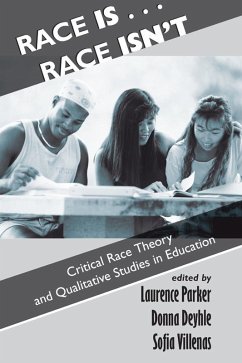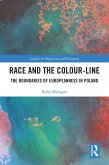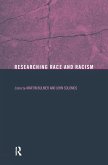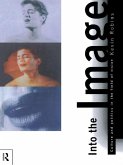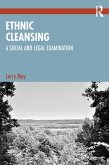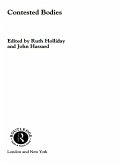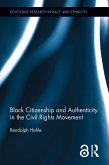Laurence Parker
Race Is...Race Isn't (eBook, ePUB)
Critical Race Theory And Qualitative Studies In Education
115,95 €
115,95 €
inkl. MwSt.
Sofort per Download lieferbar

58 °P sammeln
115,95 €
Als Download kaufen

115,95 €
inkl. MwSt.
Sofort per Download lieferbar

58 °P sammeln
Jetzt verschenken
Alle Infos zum eBook verschenken
115,95 €
inkl. MwSt.
Sofort per Download lieferbar
Alle Infos zum eBook verschenken

58 °P sammeln
Laurence Parker
Race Is...Race Isn't (eBook, ePUB)
Critical Race Theory And Qualitative Studies In Education
- Format: ePub
- Merkliste
- Auf die Merkliste
- Bewerten Bewerten
- Teilen
- Produkt teilen
- Produkterinnerung
- Produkterinnerung

Bitte loggen Sie sich zunächst in Ihr Kundenkonto ein oder registrieren Sie sich bei
bücher.de, um das eBook-Abo tolino select nutzen zu können.
Hier können Sie sich einloggen
Hier können Sie sich einloggen
Sie sind bereits eingeloggt. Klicken Sie auf 2. tolino select Abo, um fortzufahren.

Bitte loggen Sie sich zunächst in Ihr Kundenkonto ein oder registrieren Sie sich bei bücher.de, um das eBook-Abo tolino select nutzen zu können.
Critical race theory examines the social construction of the law, administrative policy, electoral politics, and political discourse in the U.S. It presents a group of qualitative research studies, literature reviews, and commentaries that collectively articulate critical race theory in secondary and post-secondary educational settings.
- Geräte: eReader
- mit Kopierschutz
- eBook Hilfe
Andere Kunden interessierten sich auch für
![Race and the Colour-Line (eBook, ePUB) Race and the Colour-Line (eBook, ePUB)]() Bolaji BalogunRace and the Colour-Line (eBook, ePUB)40,95 €
Bolaji BalogunRace and the Colour-Line (eBook, ePUB)40,95 €![Researching Race and Racism (eBook, ePUB) Researching Race and Racism (eBook, ePUB)]() Researching Race and Racism (eBook, ePUB)49,95 €
Researching Race and Racism (eBook, ePUB)49,95 €![Ethnographies of the Videogame (eBook, ePUB) Ethnographies of the Videogame (eBook, ePUB)]() Helen ThornhamEthnographies of the Videogame (eBook, ePUB)55,95 €
Helen ThornhamEthnographies of the Videogame (eBook, ePUB)55,95 €![Into the Image (eBook, ePUB) Into the Image (eBook, ePUB)]() Kevin RobinsInto the Image (eBook, ePUB)35,95 €
Kevin RobinsInto the Image (eBook, ePUB)35,95 €![Ethnic Cleansing (eBook, ePUB) Ethnic Cleansing (eBook, ePUB)]() Larry MayEthnic Cleansing (eBook, ePUB)43,95 €
Larry MayEthnic Cleansing (eBook, ePUB)43,95 €![Contested Bodies (eBook, ePUB) Contested Bodies (eBook, ePUB)]() Contested Bodies (eBook, ePUB)52,95 €
Contested Bodies (eBook, ePUB)52,95 €![Black Citizenship and Authenticity in the Civil Rights Movement (eBook, ePUB) Black Citizenship and Authenticity in the Civil Rights Movement (eBook, ePUB)]() Randolph HohleBlack Citizenship and Authenticity in the Civil Rights Movement (eBook, ePUB)0,00 €
Randolph HohleBlack Citizenship and Authenticity in the Civil Rights Movement (eBook, ePUB)0,00 €-
-
-
Critical race theory examines the social construction of the law, administrative policy, electoral politics, and political discourse in the U.S. It presents a group of qualitative research studies, literature reviews, and commentaries that collectively articulate critical race theory in secondary and post-secondary educational settings.
Dieser Download kann aus rechtlichen Gründen nur mit Rechnungsadresse in A, B, BG, CY, CZ, D, DK, EW, E, FIN, F, GR, HR, H, IRL, I, LT, L, LR, M, NL, PL, P, R, S, SLO, SK ausgeliefert werden.
Produktdetails
- Produktdetails
- Verlag: Taylor & Francis eBooks
- Seitenzahl: 296
- Erscheinungstermin: 16. April 2019
- Englisch
- ISBN-13: 9780429983139
- Artikelnr.: 56953021
- Verlag: Taylor & Francis eBooks
- Seitenzahl: 296
- Erscheinungstermin: 16. April 2019
- Englisch
- ISBN-13: 9780429983139
- Artikelnr.: 56953021
- Herstellerkennzeichnung Die Herstellerinformationen sind derzeit nicht verfügbar.
"Laurence Parker is an associate professor in the department of educational policy studies at the University of Illinois at Urbana-Champaign. His current research and teaching interests are in the areas of critical race theory and educational policy research and analysis (at the K-12 and postsecondary levels), and the politics of school choice. His most recent article, entitled ""Race is ... race ain't: An exploration of the utility of critical race theory in qualitative research in education,"" appeared in the International Journal of Qualitative Studies in Education.
Donna Deyhle is a professor of anthropology and education in the department of educational studies and in the ethnic studies program at the University of Utah, where she is also co-director of the American Indian Resource Center. She is a leading scholar in the area of American Indian educational research, and her work has appeared in the Harvard Educational Review, the Journal oj American Indian Education, Youth and Society, and the Review of Research in Education. Her research also has been an integral part of the litigation surrounding the Navajo conflicts with Anglo school officials in southern Utah. Prof. Deyhle is a former Spencer Fellow of the National Academy of Education.
Sofia Villenas is an assistant professor in the department of educational studies and in the ethnic studies program at the University of Utah. Her research centers on investigating Latino schooling and home and community education within the dynamics of racial/cultural community politics. Critical race theory informs this work, as is evident in her article co-authored with Donna Deyhle entitled ""Critical race theory and ethnographies challenging the stereotypes: Latino families, schooling, resilience and resistance,"" forthcoming in Curriculum Inquiry. As a Chicana ethnographer, Villenas also explores positionality and locality in qualitative research, as can be seen in her article ""The colonizer/colonized Chicana ethnographer: Identity, marginalization, and co-optation in the field,"" in the Harvard Educational Review. She is also a former Spencer Fellow of the National Academy of Education.
"
Donna Deyhle is a professor of anthropology and education in the department of educational studies and in the ethnic studies program at the University of Utah, where she is also co-director of the American Indian Resource Center. She is a leading scholar in the area of American Indian educational research, and her work has appeared in the Harvard Educational Review, the Journal oj American Indian Education, Youth and Society, and the Review of Research in Education. Her research also has been an integral part of the litigation surrounding the Navajo conflicts with Anglo school officials in southern Utah. Prof. Deyhle is a former Spencer Fellow of the National Academy of Education.
Sofia Villenas is an assistant professor in the department of educational studies and in the ethnic studies program at the University of Utah. Her research centers on investigating Latino schooling and home and community education within the dynamics of racial/cultural community politics. Critical race theory informs this work, as is evident in her article co-authored with Donna Deyhle entitled ""Critical race theory and ethnographies challenging the stereotypes: Latino families, schooling, resilience and resistance,"" forthcoming in Curriculum Inquiry. As a Chicana ethnographer, Villenas also explores positionality and locality in qualitative research, as can be seen in her article ""The colonizer/colonized Chicana ethnographer: Identity, marginalization, and co-optation in the field,"" in the Harvard Educational Review. She is also a former Spencer Fellow of the National Academy of Education.
"
Acknowledgments
Introduction to Critical Race Theory in Educational Research and Praxis
Just What Is Critical Race Theory and What's It Doing in a Nice Field Like Education?
Critical Race Theory and Praxis: Chicano(a)/Latino(a) and Navajo Struggles for Dignity
Educational Equity
and Social Justice
"¡Adelante!": Toward Social Justice and Empowerment in Chicana / o Communities and Chicana / o Studies
Research Methods as a Situated Response: Toward a First Nations' Methodology
Toward a Definition of a Latino Family Research Paradigm
Formations of Mexicananess: Trenzas de identidades múltiples (Growing Up Mexicana: Braids of Multiple Identities)
Race
Class
Gender
and Classroom Discourse
Critical Race Theory and Interest Convergence in the Desegregation of Higher Education
Negotiating Borders of Consciousness in the Pursuit of Education: Identity Politics and Gender of Second-Generation Korean American Women
Separate and Still Unequal: Legal Challenges to School Tracking and Ability Grouping in America's Public Schools
Conclusion
About the Editors and Contributors
Index
Introduction to Critical Race Theory in Educational Research and Praxis
Just What Is Critical Race Theory and What's It Doing in a Nice Field Like Education?
Critical Race Theory and Praxis: Chicano(a)/Latino(a) and Navajo Struggles for Dignity
Educational Equity
and Social Justice
"¡Adelante!": Toward Social Justice and Empowerment in Chicana / o Communities and Chicana / o Studies
Research Methods as a Situated Response: Toward a First Nations' Methodology
Toward a Definition of a Latino Family Research Paradigm
Formations of Mexicananess: Trenzas de identidades múltiples (Growing Up Mexicana: Braids of Multiple Identities)
Race
Class
Gender
and Classroom Discourse
Critical Race Theory and Interest Convergence in the Desegregation of Higher Education
Negotiating Borders of Consciousness in the Pursuit of Education: Identity Politics and Gender of Second-Generation Korean American Women
Separate and Still Unequal: Legal Challenges to School Tracking and Ability Grouping in America's Public Schools
Conclusion
About the Editors and Contributors
Index
Acknowledgments
Introduction to Critical Race Theory in Educational Research and Praxis
Just What Is Critical Race Theory and What's It Doing in a Nice Field Like Education?
Critical Race Theory and Praxis: Chicano(a)/Latino(a) and Navajo Struggles for Dignity
Educational Equity
and Social Justice
"¡Adelante!": Toward Social Justice and Empowerment in Chicana / o Communities and Chicana / o Studies
Research Methods as a Situated Response: Toward a First Nations' Methodology
Toward a Definition of a Latino Family Research Paradigm
Formations of Mexicananess: Trenzas de identidades múltiples (Growing Up Mexicana: Braids of Multiple Identities)
Race
Class
Gender
and Classroom Discourse
Critical Race Theory and Interest Convergence in the Desegregation of Higher Education
Negotiating Borders of Consciousness in the Pursuit of Education: Identity Politics and Gender of Second-Generation Korean American Women
Separate and Still Unequal: Legal Challenges to School Tracking and Ability Grouping in America's Public Schools
Conclusion
About the Editors and Contributors
Index
Introduction to Critical Race Theory in Educational Research and Praxis
Just What Is Critical Race Theory and What's It Doing in a Nice Field Like Education?
Critical Race Theory and Praxis: Chicano(a)/Latino(a) and Navajo Struggles for Dignity
Educational Equity
and Social Justice
"¡Adelante!": Toward Social Justice and Empowerment in Chicana / o Communities and Chicana / o Studies
Research Methods as a Situated Response: Toward a First Nations' Methodology
Toward a Definition of a Latino Family Research Paradigm
Formations of Mexicananess: Trenzas de identidades múltiples (Growing Up Mexicana: Braids of Multiple Identities)
Race
Class
Gender
and Classroom Discourse
Critical Race Theory and Interest Convergence in the Desegregation of Higher Education
Negotiating Borders of Consciousness in the Pursuit of Education: Identity Politics and Gender of Second-Generation Korean American Women
Separate and Still Unequal: Legal Challenges to School Tracking and Ability Grouping in America's Public Schools
Conclusion
About the Editors and Contributors
Index
